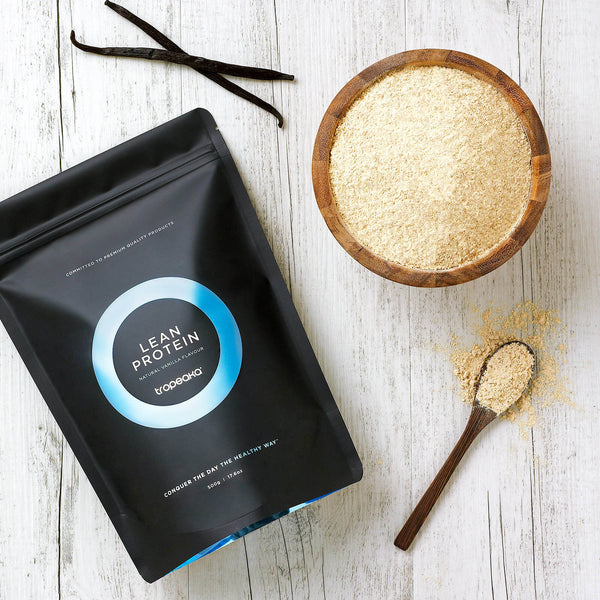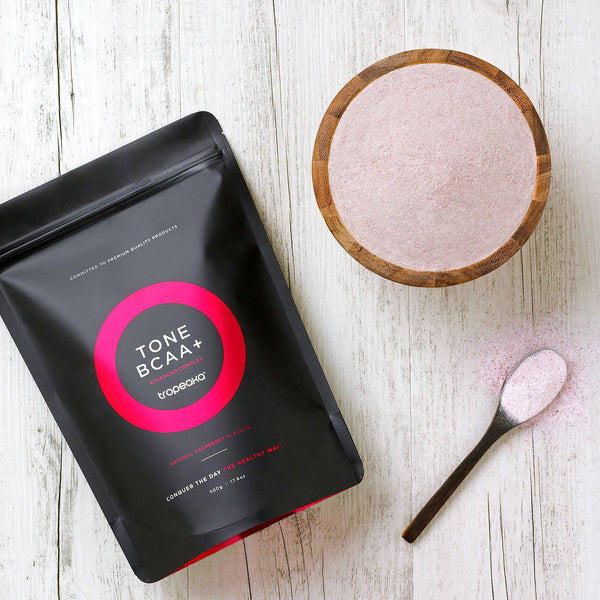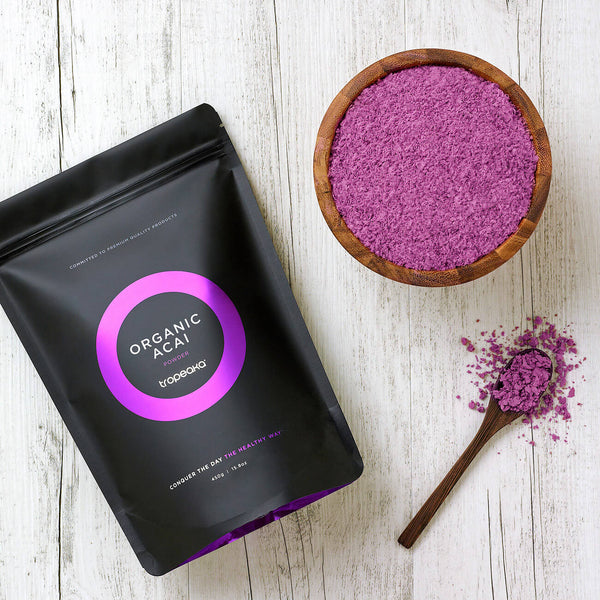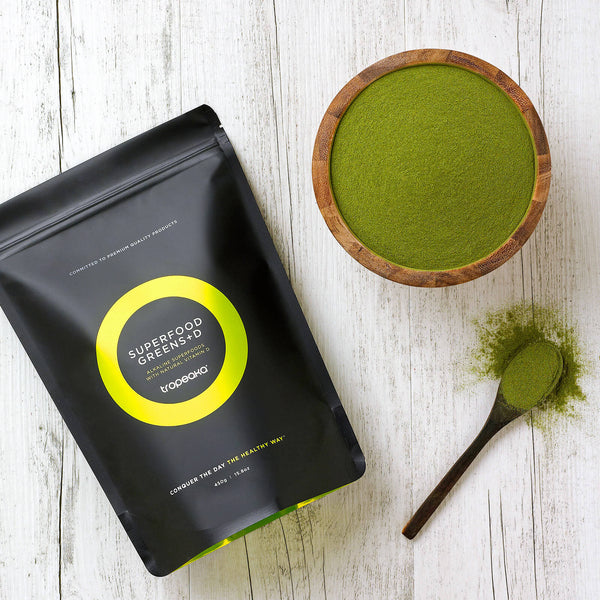If you're like many people, you might think of protein powder as something athletes and bodybuilders use to help build muscle. And while it is certainly that, protein powder can do so much more for your body!
S
o, what does protein powder do for those of us who aren't competition bodybuilders? This article will discuss all the benefits of protein powder and how it can help improve your overall health. We'll also look at what types of protein powder are available and how to choose the right one for you. So read on to learn everything you need to know!
Why do our bodies need protein?
Did you know that you can find protein in every cell in the human body? Proteins are long chains of amino acids that help the body build and repair cells. It is an essential nutrient for building and maintaining muscle, bone, skin, hair, and nails.
Protein also produces enzymes and hormones, which are important for normal growth and development—especially in children and teenagers—and helps keep our metabolism running efficiently.
These powerhouses of amino acids also strengthen your immune system, boost energy levels, and aid in proper digestion.
Protein From Foods
The best way to get sufficient protein in your diet is naturally by eating protein-rich foods and maintaining a healthy diet. Meat and poultry are both great sources of protein. But vegetarians and vegans need not worry; plenty of other foods are high in protein, including beans, peas, nuts, and lentils.

The biggest difference between animal-based and plant-based proteins is their makeup of amino acids. Animal-based protein contains more essential amino acids, making it "easier" to get a full amino acid profile. This means that your body can use it more efficiently. However, this doesn't mean you should avoid plant-based proteins—you can still get the amino acids you need by eating various plant-based proteins throughout the day.
Animal-based foods that are high in protein:
- red meat like beef, bison, or venison
- fish, especially salmon, tuna, herring, and sardines
- pork
- eggs
- cheese
- milk
- cottage cheese
- chicken
- turkey
Plant-based foods that are high in protein:
- peanuts
- almonds
- brazil nuts
- chickpeas
- quinoa
- chia seeds
- hemp seeds
- flaxseeds
- beans
- tofu
- peas
- soy
How to Calculate Your Protein Needs
The amount of protein we need in our diet depends on a number of factors, including our age, activity level, and muscle mass. The recommended dietary allowance (RDA) for protein is 0.8 grams per kilogram or 0.36 grams per pound of body weight.

By using this simple formula and without considering other factors, a 150-pound woman would need 54 grams of protein per day. A 250-pound man would need 90 grams of protein per day.
But there are other factors to consider when calculating your recommended protein intake, including age, whether or not you are trying to lose weight or build muscle mass, and how active you are. Additionally, those who are pregnant or nursing will need to increase their protein intake to support the growing baby.
If you want to learn more about how to calculate your specific protein needs, there are many online calculators that can help. However, like with all things on the internet, you should make sure to do proper research and always consult with your doctor before starting or changing any dietary routines.
Protein powder is a dietary supplement that consists of protein isolated from food sources
What is Protein Powder?
Now that we know how to figure out how much protein we need in our diets, the real tricky part begins. How do we manage to GET enough protein in our diets each day? Some days, it's hard enough just to get a workout in, let alone find the time to come home and whip up a quinoa salad or grill a piece of salmon around a full work day.

That's where protein powder comes in.
Protein powder is a dietary supplement that consists of protein isolated from food sources. As the term "dietary supplement" indicates, it is meant to supplement natural protein sources, not replace them completely.
You should strive to get the majority of your protein from a healthy diet, but a good protein powder can help bridge the gap when you're trying to build muscle mass, lose weight, or increase your protein intake for various other reasons.
As a nutritional supplement, protein powder can be flavored or unflavored and is usually mixed with water or milk or added to a smoothie or other drink.
Understanding the Terminology: Whey Protein, Plant-Based Proteins, and Essential Amino Acids
Protein powder comes in many different forms. The most common types of protein powder are whey protein and plant-based protein. Whey protein is made from milk and the by-product of cheese making, while plant-based protein is made from...you guessed it, plants.
Whey protein powder is a popular option with athletes, and you'll see lots of it on the market because it is a complete protein that includes all nine essential amino acids. Some plant-based protein supplements don't contain all essential amino acids and sometimes need to be combined.
However, whey protein isn't nearly as nutrient-dense as plant-based protein, which provides a broader range of nutrients that are easier for the body to digest and absorb. Additionally, because whey protein is derived from milk, those who are lactose-intolerant or have other dairy allergies may have a hard time digesting a whey protein supplement.
Here's a look at some of the different types of plant-based protein powders on the market:
- Hemp protein powder: Hemp protein powder is a complete protein that is also high in fiber. It also contains omega-6 and omega-3 fats that promote heart health. It is vegan and vegetarian friendly but can have a gritty texture, and some describe its taste as "earthy," so it's best when mixed into smoothies or combined with other flavorful foods or drinks.
- Pea protein powder: This vegan protein powder is another quality option to support muscle growth, weight loss, and heart health. Of all the plant-based proteins, pea protein is one of the more easily-digestible options. It's also great for those who suffer from allergies or have special diets because it is vegan, gluten-free, dairy-free, and free from the top food allergens like nuts, eggs, and shellfish.
Soy protein powder: Another vegan-friendly option, soy protein is a complete protein that contains very few carbohydrates or fat. This option is not as easily-digestible as other plant-based proteins and may cause GI upset in those who have sensitive stomachs.
Is protein powder actually helpful?
You might be wondering if protein powder is actually helpful or if it's just another marketing gimmick to sell a new product. There are many health benefits to using protein powder as a dietary supplement. But let us be clear, adding a few protein shakes into your diet does not mean you can skip the rest of the food pyramid and binge on popcorn and diet colas all day. You should strive for a mix of natural, complete proteins and supplement with a well-made, high quality protein powder to help you reach your fitness and health goals.
Those who use protein powder for weight management should aim to eat high protein foods at each meal
Benefits of Adding Protein Powder to Your Diet
- Muscle recovery: A protein shake after a workout can help you gain muscle mass and aid in recovery.
- Maintain a healthy weight: If you are looking to lose weight or maintain a healthy weight, a protein shake may be a good option as a meal replacement once a day.
- Fight fatigue: If you're always tired, take a look at what you're eating throughout the day. If you aren't getting enough protein in your diet from plant and animal sources, consider adding protein powders to make sure you're getting sufficient nutrients to keep you going throughout the day.
- Promotes gut health: The right protein powder can help heal the gut lining. Just be sure to choose protein powders that are easily digestible and avoid taking whey protein if you have milk or dairy allergies.
- Boosts metabolism: Combining a high-protein diet with exercise and strength training can boost metabolism because you'll be focused on muscle growth, and muscle burns more calories than fat. If you're looking to lose weight, increasing your metabolism is a good thing! Especially if you consume your protein within 30 minutes of waking up. Think of it as kick-starting your daily metabolism.
Things to Look Out For
As with any dietary supplement, protein powder isn't a magic bullet, and it doesn't come without its risks. The FDA doesn't regulate protein supplements, so you should definitely make sure you're getting high-quality and clean protein powders (free from heavy metals and toxins) made by a reputable company that is fully transparent with its ingredients.
Some protein powders are packed with tons of added sugars and calories. Especially if weight loss is your goal, stick to protein powders with a lower sugar and fat content and made from organic protein, like Tropeaka’s Lean Protein Powder, which comes in various flavors. Additionally, if you're planning to make protein shakes or smoothies, consider what other ingredients you're adding and make sure you aren't packing in too many calories or unhealthy fats.
Is there such a thing as too much protein? Yes, there can be, however in very rare cases. Those who consume a very large amount of protein over a long period of time may potentially be at a higher risk for kidney stones or, in the case of too much protein from red meat, there is evidence to suggest a possible increase in the risk of heart disease, or other chronic illnesses.
When to Increase Your Protein Intake
There are a few key times when you should consider adding more protein to your diet. If you are an athlete or fitness enthusiast focused on muscle growth, you will need more protein than you would if you weren't strength training regularly. In this case, aim to consume protein shakes or smoothies within 60 minutes of finishing a workout. It's great for muscle recovery, and your body will thank you later!
Those who use protein powder for weight management should aim to eat high protein foods at each meal. Consider using protein supplementation to replace one meal per day.
Those who are pregnant or nursing may also need added protein supplementation to ensure they are getting enough nutrients while growing their new bundle of joy. You should always consult with your doctor before adding any protein powders to your diet if you are pregnant or breastfeeding, though.
How to Use Protein Powder
Depending on your health goals, you can use protein supplements either as a meal replacement or as a post-workout recovery drink.

When is the best time to have a protein shake?
When you exercise, you cause microtrauma—tiny tears and trauma—to your muscles. While this sounds scary, it's actually not a bad thing, and it's needed for muscle growth as protein helps repair, grow and recover your muscles. The best time to consume protein powder during your post-exercise anabolic window (15-60 minutes after your workout ends) when muscle protein synthesis is at its max.
Best Ways to Take Protein Powder
There are so many ways to consume protein powders: added to your coffee, mixed into yogurt or oatmeal, or just make a protein shake by mixing your powder with water in a shaker bottle. But our favorite way to consume protein powder is in smoothies, where there are endless options to get creative and give yourself a nutritional boost!
This Strawberry Banana Breakfast Smoothie is a crowd favorite!

INGREDIENTS
- 1 cup fresh strawberries
- 1 large frozen banana
- 1/4 cup vegan yogurt
- 1/4 cup quick or rolled oats
- 1 tbsp Tropeka Lean Protein Vanilla
- 1/2 cup apple juice
- 1/2 cup plant-based milk
Simply add all the ingredients into a blender and blend until smooth. Pour into your favorite cup and enjoy!
Check out some of our other smoothie recipes!
Did this answer all of your questions about protein? Let us know if you have any questions!





